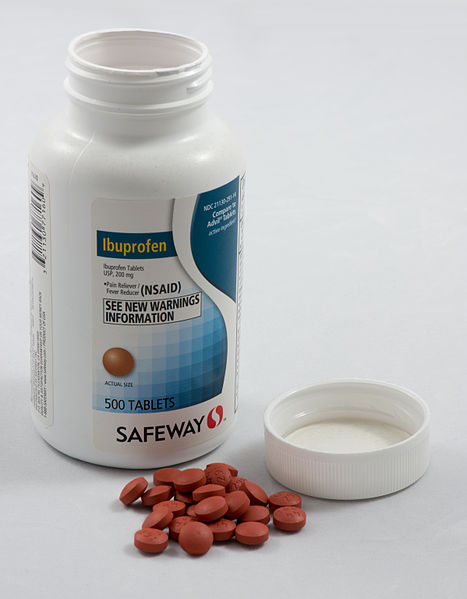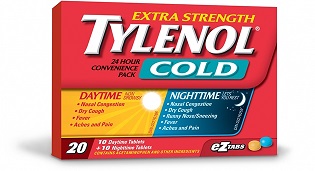Can You Take Ibuprofen and Tylenol Together if on Baby Aspirin Daily
Contents
- Can you take Ibuprofen with different Tylenol products
- What is Ibuprofen
- What is Tylenol
- How Ibuprofen and Tylenol piece of work in the trunk
- Can patients take Ibuprofen and Tylenol together
- Special precautions and warnings during Ibuprofen and Tylenol assistants:
Can you take Ibuprofen with different Tylenol products
What is Ibuprofen
Ibuprofen is a nonsteroidal anti-inflammatory drug (NSAID). Ibuprofen is a generic proper noun for a drug containing the aforementioned name active ingredient.
It is used as a hurting reliever for diverse conditions such every bit: headaches, dental pain, muscle pain, tendinitis (inflammation or irritation of a tendon, a thick string that attaches bone to muscle), menstrual cramps, and for the treatment of hurting, swelling and joint stiffness caused by arthritis, osteoarthritis, juvenile arthritis, bursitis, ankylosing spondylitis, psoriatic arthritis and gout.
It tin can besides be used to temporarily reduce fever and for the treatment of cold symptoms. Ibuprofen may be used intravascular with opiates for relieving moderate to severe pain. Ibuprofen lysine may be likewise used intravscular as a therapy for premature neonates with ductus arteriosus.
Ibuprofen is bachelor in following dosage forms and strengths: sheathing, sheathing liquid filled, capsule coated (200, 220 and 400 mg), injection (100mg/ml), oral liquid (100 mg/5mL and 50 mg/1.25mL), solution (100 mg, 100 mg/5mL), suspension (100 mg, 200 mg/10mL, 100 mg/5mL) and tablet (200, 300, 400, 600 and 800 mg).
Common Make names for ibuprofen are: Advil, Motrin, Brufen, Calprofen, Genpril, Ibu, Midol, Nuprin, Cuprofen, Nurofen, Ibuprofen 800 and PediaCare Children'southward Pain Reliever/Fever Reducer IB.

What is Tylenol
Tylenol is a Make name for a drug that contains acetaminophen (also known every bit paracetamol) that has antypiretic and analgesic properties. It is used for reducing pain and fever and also for relieving the symptoms of mutual cold, cough, headache, toothache, allergies and influenza. Usual per oral doses for Tylenol are 325-650 mg. Information technology is available in tablets, caplets and liquid dosage forms.
Tylenol products on the market are: Tylenol Actress Forcefulness Caplets, Tylenol Regular Strength Tablets, Tylenol eight Hour Extended-Release Caplets, Tylenol eight Hour Arthritis Pain, Tylenol Sinus Congestion & Hurting Caplets, Tylenol Cold Multi-Symptom Caplets and Liquid, Tylenol Cold Head Congestion Severe Caplets, Tylenol PM Caplets and Tylenol Common cold Sore Throat Liquid.
Tylenol Extra Force are caplets containing only Acetaminophen 500mg equally an active ingredient that is used as a pain reliever/fever reducer.
Tylenol Cold are too caplets containing: Acetaminophen 325mg as a pain reliever/fever reducer, Dextromethorphan 10mg as a coughing suppressant and Phenylephrine HCl 5mg as a nasal decongestant.
Tylenol Sinus is another Tylenol product that is used for relieving the symptoms of: sinus headache, sinus pain and force per unit area, sinus congestion, aches and pain and runny olfactory organ and sneezing (in Nighttime simply). It is bachelor in tablet form containing: acetaminophen 500 mg equally a hurting reliever/fever reducer and phenylephrine hydrochloride, 5 mg every bit a nasal decongestant, and chlorpheniramine maleate 2mg as an antihistamine.
Tylenol-Codeine is a combination of acetaminophen 500 mg and codeine 8 mg that is used for relieving mild to moderate hurting, fever reduce and as a cough suppressant.

How Ibuprofen and Tylenol work in the body
Ibuprofen inhibits synthesis of prostaglandins (substances in the body that play a key role in pain and inflammation processes in body tissues) by inhibiting at least ii cyclooxygenase (COX) isoenzymes, COX-one and COX-2.
Inhibition of COX-2 leads to the anti-inflammatory, analgesic and antipyretic effects while the inhibition of COX-1 may crusade gastrointestinal bleeding and ulcers.
Ibuprofen has the everyman gamble of causing gastrointestinal bleeding of all NSAID, producing balanced inhibitory effects on both COX-1 and COX-2 isoenzymes. Only, this reward is lost at high doses.
This drug may also inhibit chemotaxis, decrease proinflammatory cytokine activity, alter lymphocyte action, and inhibit neutrophil aggregation – these effects may also contribute to anti-inflammatory activity.
Acetaminophen is highly selective COX-2 inhibitor that inhibits prostaglandin synthesis. It can inhibit COX-2 in CNS. Acetaminophen also acts on the hypothalamic estrus regulating centers to produce antipyresis.
Acetaminophen's reactive metabolite Northward-acetyl-p-benzoquinone imine (NAPQI) tin crusade a potentially fatal, hepatic necrosis through the process of lipid peroxidation if acetaminophen is overdosed (more than 4g daily).
Dextromethorphan acts on cough center in medulla by decreasing sensitivity of coughing receptors and by interrupting impulse transmission.
Phenylephrine is sympathomimetic with direct activeness on the adrenergic receptor system. The vasoconstriction is produced later α-adrenergic receptors activation.
Chlorpheniramine is adversary of histamine H1 receptor. It has been also shown that this drug is besides a serotonin-norepinephrine reuptake inhibitor.
Codeine is an opioid analgesic which is chemically related to morphine just it has less strong analgesic properties and mild allaying effects. Information technology also acts suppress cough by centrally mechanisms.
Tin patients have Ibuprofen and Tylenol together
Concomitant administration of ibuprofen in doses of 200 to 400 mg with Tylenol products is safe combination. There are also products on the market containing both, ibuprofen and acetaminophen in i dosage form, usually tablet.
Even so, specific populations, such as patients with breadbasket problems and ulcers should be advised to apply but Tylenol products for pain/fever relief, while patients with liver bug should be advised to have merely Ibuprofen instead of Tylenol.
800 mg of Ibuprofen is a strong dose for whatever pain, and this dose of Ibuprofen shouldn't be taken together with Tylenol products. If pain is non relieved after four hours of Ibuprofen 800 mg administration, so patients can accept the other drug, simply never at the same time with this dose of ibuprofen, because information technology tin can upset stomach and may also crusade haemorrhage if it is used together with other analgesics.
The table below shows side effects after Tylenol and Ibuprofen assistants in recommendable doses. This Incidence can be significantly increased if these drugs are overdosed or taken together.
| Mutual side effects 1-10 % | Epigastric pain (3-9%), Heartburn (iii-9%), Nausea (3-9%) Dizziness (iii-ix%), Tinnitus (three-9%), Rash (3-9%), Headache (ane-3%), Vomiting (i-3%), Edema (1-iii%), Fluid retentiveness (1-three%), Constipation (1-3%) |
| Frequency Not Defined | Disorientation, Angioedema, Gastrointestinal hemorrhage, Laryngeal edema, Pruritic maculopapular rash, Hyperammonemia, Leukopenia, Neutropenia, Pancytopenia, Thrombocytopenia, Agranulocytosis, Stevens-Johnson syndrome, Toxic epidermal necrolysis, Urticaria, , Thrombocytopenic purpura, Hepatotoxicity, Liver failure, Nephrotoxicity, Pneumonitis |
Special precautions and warnings during Ibuprofen and Tylenol administration:
- Patients should tell their doctor and pharmacist if they are allergic to acetaminophen, ibuprofen, aspirin or whatsoever other NSAIDs such as ketoprofen and naproxen or whatsoever other medicines, or any of the inactive ingredients in Tylenol or Ibuprofen products.
- Patients should too tell their doc and pharmacist what prescription and nonprescription medicines, nutritional supplements, herbal products or vitamins, they are taking or plan to take. Patients should mention to their doctor if they are using post-obit drugs: ACE inhibitors such as: enalapril (Vasotec), fosinopril (Monopril), lisinopril (Prinivil), benazepril (Lotensin), captopril (Capoten), moexipril (Univasc), diuretics lithium (Eskalith, Lithobid) and methotrexate (Rheumatrex). Medico may demand to alter the doses of these medications or monitor more carefully for side furnishings.
- Patients should not have nonprescription ibuprofen with any other analgesic unless doctor tells that should.
- Patients should tell their doc if they have or accept ever had any of post-obit atmospheric condition such as: asthma, frequent stuffed or runny olfactory organ or nasal polyps, swelling of the inside of the nose, swelling of the artillery, feet, ankles, hands, or lower legs; lupus or liver or kidney illness.
- Patients should tell their medico if they have ever had a rash while taking acetaminophen.
- Patients with phenylketonuria should avoid these medicines.
- Patients should also know that combination acetaminophen products for cough and colds containing cough suppressants expectorants, nasal decongestants and antihistamines, should not exist used in children younger than 2 years of historic period. In children 2 through 11 years of age such combinations should be used carefully and only according to the directions on the label.
- If patients are giving ibuprofen to a child, it is of import to tell the child'southward doctor if the child has not been drinking fluids or has lost a large amount of fluid from repeated airsickness or diarrhea.
- Women should tell their doctor if they are pregnant, especially if they are in the last few months of pregnancy; and also if they become pregnant; or if they are breast-feeding.
- Patients should avoid booze while using these medications. Drinking alcohol can increment certain side effects of these medications. Alcohol may increment the risk of liver damage while taking Tylenol.
- Tylenol can crusade unusual results with certain laboratory tests for glucose in the urine.
- Patients should avert becoming dehydrated or overheated during exercises. Chlorpheniramine can decrease sweating and patients could get more than prone to rut stroke
- Patients should avoid these medications if they likewise take caffeine pills, nutrition pills, or other stimulants. Taking decongestants (pseudoefedrine, phenylephrine) together with stimulants tin increase the take chances of unpleasant side effects.
" How Levothyroxine works"
"Naproxen and Ibuprofen drug interaction"
Source: https://drugsdetails.com/tylenol-and-ibuprofen/
Post a Comment for "Can You Take Ibuprofen and Tylenol Together if on Baby Aspirin Daily"